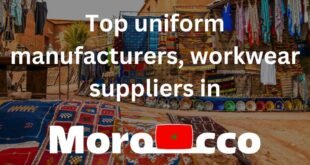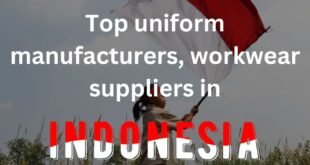Among the top list of garment manufacturing companies in Myanmar, one can find many international brands that are seeking to source garments from the country. According to a recent report, the Chinese nationals are funding about a third of the 600 garment factories in the country, and sourcing interest from international apparel brands is growing. This article will give you a brief insight into the garment industry in the country, and why it is important to consider purchasing garments from Myanmar.
1 Chinese nationals fund nearly a third of Myanmar’s 600 garment factories
During the last decade, a wave of Chinese investors have poured capital into the country to help develop its garment industry. The sector is vital to Myanmar’s economy and is home to about 700,000 low-income workers. As the economy has grown, the number of workers has increased, allowing them to earn enough to send money back to their families.
There has also been widespread anti-Chinese sentiment since the military’s overthrow of the civilian government, which was led by Aung San Suu Kyi. There has been a lot of talk about economic sanctions, which would affect hundreds of thousands of families. Although China has avoided publicly criticizing the coup, some observers have called for a rethink.
The biggest player in the garment industry is the Myanmar Garment Manufacturers Association, which is comprised of about 600 garment factories. Nearly a third of these factories are funded by Chinese nationals.
The most interesting part is the fact that the garment industry is still growing in Myanmar. During the period of economic reforms, the manufacturing sector grew rapidly. This helped to develop the country’s manufacturing hub and gave garment workers a way out of poverty.
But the big question remains: will the junta’s failure to return a democratically elected government to power lead to the collapse of the garment industry? The Lat War garments factory in the heart of the country has over 3,500 employees. Those workers are worried about next season’s orders.
The most important thing to know about the garment industry is that most of the manufacturing takes place in Yangon, the country’s largest city. In recent years, a wave of Chinese investors have funded about half of these factories, which have created a burgeoning garment hub. But the fate of these factories has put the spotlight on Beijing’s role in the country.
The Generalized System of Preferences scheme is a trade scheme administered by the United States that allows developing countries to receive more generous trade incentives. The scheme is still in development and could have serious consequences for the garment industry in Myanmar.
2 Job losses in the garment industry
Thousands of workers in the garment industry in Myanmar are facing job losses. This is because a deadly virus, called COVID-19, has affected the country’s clothing factories. The industry’s prospects look grim, with more than 100 factories forced to close their doors.
The European Union has launched the Myan Ku Fund to provide immediate assistance to workers in Myanmar. But critics say the initiative will only hurt the industry’s reputation and may lead to mass unemployment. The EU has warned that broader economic sanctions could also have a negative impact on businesses.
The Industrial Workers Federation of Myanmar has stepped in to negotiate with Kamcaine Manufacturing to reinstate 57 IWFM members who were fired after a deadly virus called COVID-19 hit the country. The factory had suspended operations in July.
The International Labor Organization estimates that 1.6 million jobs will be lost in Myanmar by 2021, including a quarter of a million in the garment sector. ILO reports show that many workers are not receiving their entitlements, including severance pay.
As part of its social dialogue on freedom of association, the Industrial Workers Federation of Myanmar negotiated with Kamcaine Manufacturing to ensure that 57 IWMF members were reinstated. But the factory has not responded to multiple requests for comment.
As the economy continues to struggle, European and other international buyers have been wondering whether they should continue to source from Myanmar. Brands have begun to cut back orders in recent months, and some have already pulled out. In late August, activists began calling for a boycott of the country. This campaign has put more pressure on global fashion brands to stop sourcing from Myanmar.
But some apparel companies and foreign investors have expressed concern that more economic sanctions would have a negative impact on the industry. Some retailers have already pulled out, while others are quietly withdrawing.
The European Parliament has urged for a swift review of the benefits of EU trade ties to Myanmar. It has also warned that broader sanctions will widen the gaps in decent work in Asia.
3 China is an important market for Myanmar’s non-agricultural products
Several economic cooperation projects have been implemented between China and Myanmar over the years. However, most have failed due to inadequate planning or shoddy implementation. In addition, the complexities of the Myanmar political landscape have also been a factor. There have been many incidents of ethnic minorities and the national army clashing, leading to the suspension of several economic cooperation projects. The Chinese government has also been closely watching the domestic political situation in Myanmar.
Although there have been significant efforts in building energy pipelines between China and Myanmar, some of these projects have been stymied by low crude oil prices. There have also been concerns over the environmental impacts of indiscriminate logging in northern Myanmar. Moreover, Chinese investors have invested heavily in fruit cultivation along the border. The emergence of commercial banana cultivation along the border is a good example of this.
The Chinese government has been working on “good-neighbor diplomacy” with Asian countries, and has adopted a policy of noninterference in other country’s internal affairs. It has also developed cooperation with the officials of the National League for Democracy, which is based in Myanmar. These projects have included the construction of a gas pipeline and a crude oil pipeline. These pipelines run parallel to each other and carry crude oil from Africa and Middle East to Chongqing City in China.
In addition, many Chinese projects have been driven by technological advancements and Chinese funds. Some of these have been implemented unilaterally, while others have been more in line with what the Chinese government considers to be the best practices. This study examines the importance of the Chinese government’s strategy of securing access to energy resources in Southeast Asia, focusing on the development of Sino-Myanmar economic cooperation.
The authors conducted extensive fieldwork in border areas, including interviews with Chinese and Burmese investors. In addition, they conducted household surveys to evaluate the extent of fruit production in these areas. They also randomly asked investors from other provinces in China about the conditions of their own fruit farms.
4 International apparel brands have shown a growing sourcing interest in Myanmar
Despite a decade of political isolation and corruption, international apparel brands have begun to turn their attention towards Burma. The European retail sector is particularly interested in sourcing from Burma, as the country enjoys a liberalized trade regime. It also has a low capital-intensive industry, which means it is easy to set up. However, it will need to ensure a smooth financing system, raw materials, social certification, and environmental certification.
The United States and Europe have lifted all sanctions on Myanmar in 2012. But the European Union may reinstate them if reforms slow down. Several trade groups are working on opening up the Burmese industry. Some of these groups include the Foreign Trade Association (FTA) and the Industrial Workers’ Federation of Myanmar.
According to a report by Textiles Intelligence, Myanmar could have up to 1.5 million jobs in the garment industry by 2020. This would be a significant increase over the 230,000 jobs that were employed in mid-2015. But in the short term, demand from Western retailers is unlikely to increase rapidly.
The Myanmar government has published a National Export Strategy for the textile and garment sector. It is aimed at improving the competitiveness of the industry and encouraging sustainable production. It has advised the textile and garment industry to increase the volume of knitted products and the quality of design. It is also important to produce more original designs.
Sohel Sadat, Chairman of Shin Shin Apparels, believes the Myanmar apparel industry will take ten years to reach a sustainable level. He says the industry will need to be based on high-quality textiles and modern machinery, and will need to establish social and environmental standards.
Some apparel brands, such as Gap, have started sourcing from Myanmar. The company sets the wage for factories it sources through at $110 a month. The Industrial Workers’ Federation of Myanmar has called on all international brands to issue a public statement in support of the rights of workers in the country. They are also asking global brands to exercise due diligence in ensuring that their suppliers respect workers’ rights.
 Henry Pham (Pham Quang Anh), CEO of DONY Garment
Henry Pham (Pham Quang Anh), CEO of DONY Garment
This year, we have found that many international buyers are seeking new suppliers based in nations outside of China and Thailand to purchase many goods and products, including uniforms, workwear, reusable cloth face mask, and protective clothing.
At DONY Garment, we are proud to welcome international customers, especially those based in the US, Canada, the Middle East, and the EU market to discover the professional production line at our factory in Vietnam.
We guarantee our products are of the highest quality, at an affordable cost, and easy to transport across the world.
 Dony Garment Vietnamese Garment Factory Supplier – Apparel Clothing & Textile Manufactured. Private label clothing Produce women, men, children baby wear – Casual Clothing, Uniform, Workwear
Dony Garment Vietnamese Garment Factory Supplier – Apparel Clothing & Textile Manufactured. Private label clothing Produce women, men, children baby wear – Casual Clothing, Uniform, Workwear






 Henry Pham (Pham Quang Anh), CEO of DONY Garment
Henry Pham (Pham Quang Anh), CEO of DONY Garment



